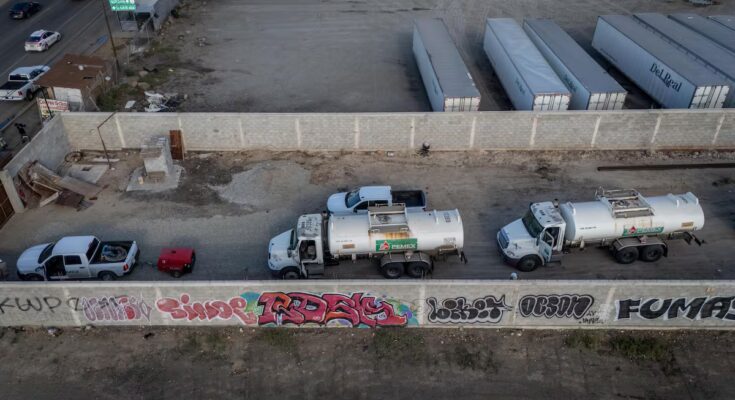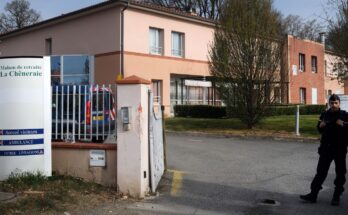The trial of the Jensen family in the United States has shed more light on the criminal scheme that allowed the smuggling of thousands of crude oil shipments stolen from Pemex, Mexico’s parastate oil company. U.S. security agencies are cooperating with a protected witness who served as an intermediary between the Jensens and leaders of the Jalisco New Generation (CJNG) cartel, which the Treasury Department identifies as responsible for the theft and trafficking of hydrocarbons in Mexico, known as huachicol. Donald Trump’s government accuses the Jensens not only of having introduced crude oil into the United States in the guise of other substances to avoid paying taxes, but also of money laundering and, above all, of financing a criminal terrorist organization, a category in which Trump has classified a dozen cartels, one of these, that of Nemesio Oseguera, El Mencho. The Jensens’ defense claims that there is no evidence that they knew they were dealing with the transnational criminal organization, as their only confirmed contact was with the transnational criminal organization. broker.
Court documents accessed by EL PAÍS show that Washington has strengthened the charges against the Jensens, in particular against the family patriarch, tycoon James Lael, 68, and one of his sons, Maxwell. First, it accuses them of having illegally introduced 4,170 shipments of crude oil between January 2018 and January 2025, falsely declaring that they were waste or distillates (in the original indictment the figure indicated was 2,881 shipments). The oil was then transported in containers of the family company, Arroyo Terminals LLC, based in Rio Hondo, Texas. According to the documents, the trafficked material left them with a profit of $300 million. James’ wife, Kelly Anne Jansen, and his second son, Zachary Golden, who were also accused of taking part in the crime plot, were granted parole.
The cooperating witness, identified in court documents as CI-1 (the acronym corresponds to confidential informant), has been in dialogue with the DEA, the American anti-drug agency, since mid-2024. The subject revealed that he has continuous and direct collaboration with some CJNG executives, in particular with Ivan Cazarín Molina, The tankand César Morfín Morfín, Cousin. The first was identified by the Treasury Department in 2024 as part of a fuel theft ring generating millions in profits for the CJNG. The Treasury noted that El Tanque “reports directly” to El Mencho and is part of his “intimate circle of trusted collaborators.” Its main operational bases are Jalisco and Veracruz. It is precisely in the latter state that, according to the bulletin released by the US agency, the fuel stolen from Pemex is usually stored through clandestine seizures of oil pipelines.
In May this year, Treasury sanctioned Primito, who it identified as the leader of the CJNG square in Tamaulipas. In that report, he indicated that Primito had focused his business on the theft of hydrocarbons and their smuggling into the United States, and that he controlled the collection of extortion fees for crossing fuel tanks at crossings between Tamaulipas and Texas. At the time Treasury announced its sanctions, the Jensens were not known to be linked to the Huachicol leadership of the Jalisco cartel. The missing piece was the broker collaborating with Washington in the trial, who assured the agents that he had become friends with Primito and had even had a business together since 2021. In turn, he knew Tank so well that in one of the conversations he provided him with “precise references”.
Witness CI-1 reported that, before becoming corrupt, he had been a “legitimate and prominent businessman” with a Mexico-based company dedicated to importing oil, gas, and used petroleum from Mexico to the United States and vice versa. He said at the time he had to pay the “cartels” $2,000 per tanker to transport their products to Mexico. He then added that “he was extorted by various cartels to do business.”
Linking up with CJNG leaders, CI-1 adopted criminal roles himself. “CI-1 explained that it had gained control of several highways in Mexico and was in charge of collection apartments or extortion on behalf of the cartel, money that CI-1 would then use to bribe federal, state, and local officials,” court documents read. “CI-1 explained that, without extortion payments, the cartels would not allow products to be transported to Mexico. CI-1 then described a scheme in which Mexican customs agents falsified documents to export certain crude petroleum products to the United States,” court documents say.
The witness said that the oil smuggled into the United States was stolen from Pemex with the help of corrupt officials of the parastatal and mentioned a U.S. company as a known buyer of the crude oil extracted in Mexico, although the name of that company was not recorded in the court documents. In various conversations he had with US agents in 2024 and 2025, the witness “detailed his knowledge of the CJNG hierarchies” and mentioned leaders such as Héctor Álvarez Álvarez, The H.; Carlo Roel, Chu 7and other characters identified only by their aliases: El X, Nareda, and Toothless.
After detailing his dealings with cartel leaders, CI-1 then discussed his business dealings with the Jensens, the documents indicate. The Jensens’ lawyers defend the possibility that they did not know they were dealing with the CJNG or that the fuel they had received had been stolen. This is an attempt to overturn the serious accusation of having provided financing to a terrorist organization. Aside from this dispute, court documents show that, at least, a business relationship existed between CI-1 and the Jensens.
The witness agreed with the DEA to participate in meetings with the Jensens with microphones and to record phone calls with them. At many of these meetings, the business of transporting crude oil to the United States and the payments to be made were discussed. In mid-April, CI-1 summoned James and Maxwell to an urgent meeting in Dallas to tell them about a supposed crude oil supplier from Mexico who was offering an unbeatable price. It was organized to obtain evidence against the Jensens.
There, in a seafood restaurant “full of people,” the intermediary talked about his relationship with the CJNG (he said he “worked with those guys even if he didn’t like them”), named the leaders and recalled that only two months ago President Trump had classified them as “damn terrorists.” The documents do not record what the Jensens’ reaction was, but they helped authorities support their case that they “knew” they were dealing with the El Mencho cartel. Shortly after the arranged meeting, on April 23, the Jensens were arrested.



